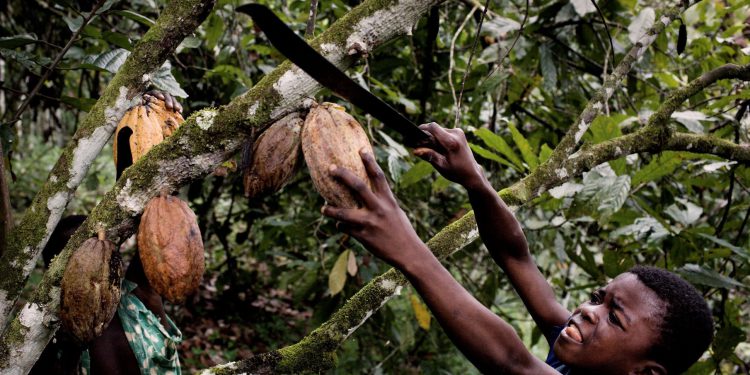Campaigners have dismissed new reports by chocolate companies that child labour is being addressed in their supply chains.
Despite a commitment to end child labour by 2005, companies including Barry Callebaut now say they will succeed by 2025.
Swiss chocolate supplier Barry Callebaut is among the world’s biggest producers, processing almost one million tonnes of cocoa beans a year, about a fifth of the global volume.
The company has reported 21,000 child workers in its supply chain in the financial year to August 2021.
Child labour is on the rise in West Africa, according to a report commissioned by the Bureau of International Labor Affairs (ILAB) at the US Department of Labor, and conducted by the University of Chicago. It estimated that 1.56 million children work in cocoa production in West Africa. It says 45 per cent of children in agricultural households in Ghana and Ivory Coast (Cote D’Ivoire) are put to work in cocoa production.
“The chocolate giants are not denying the child slavery in their supply chains”
Barry Callebaut CEO Peter Boone told a recent Reuters conference, “We cannot close our eyes to something which is out there we know should not be part of our supply chain.”
He described the new 2025 goal to eradicate child labour as, “a tremendous objective,” adding, “there is still a lot of work.”
The company is one of seven named in a US class action brought on behalf of eight former child slaves trafficked from Mali into cocoa production in Ivory Coast.
The lawyer leading the action Terrence Collingsworth of International Rights Advocates, says, “Barry Callebaut and the chocolate giants named in our action are not denying the child slavery in their supply chains.
“What doesn’t make sense is for them to commit to eradicating child labour – whether it was supposed to be in 2005 or 2025 – and then on the other hand, claim that they have no legal responsibility for the children producing their cocoa.
“It is absolutely unconscionable that they are telling the court they are not responsible while trying to convince consumers they are on the verge of solving the child labour problem with ‘their farmers‘.”
“Our inaction on child labour is not a violation of the law”
Terrence Collingsworth says he needs “merely to show the chocolate companies acted together and knowingly benefitted from forced labour or trafficking.”
In September he filed an Opposition brief and the companies he accuses filed their reply last month. A hearing date is expected to be set for early next year.
The Opposition brief says its facts are undisputed; the eight men it represents experienced the trauma of being “trafficked as children from Mali and then enslaved and forced to perform hazardous work harvesting cocoa in Cote D’Ivoire.
“They allege that they worked on plantations that supplied to a venture between Defendants Nestlé, Cargill, Barry Callebaut, Mars, Olam, Hershey, and Mondelēz, seven multinational conglomerates that dominate all aspects of the world’s cocoa production and chocolate sales. Together, these Defendants control 70 per cent of cocoa produced in Cote D’Ivoire.
“The Defendants claim they are mere purchasers of cocoa and have no responsibility for trafficked and forced child labor in their cocoa supply chains in Cote D’Ivoire.”
“The seven companies named could multiply the price they pay farmers by five times tomorrow”
Acting together, the chocolate companies have replied that there is no “direct connection” between them and the trafficked children or those who forced them to work.
They add that their inaction regarding commitments to stop using child labour is not a violation of the relevant law.
And they say they cannot be held responsible for violations that didn’t occur in the United States.
While they add that child labour should not be conflated with forced labour, generally hazardous work, such as using machetes on cocoa plantations, is not viewed as labour children can legally agree to.
The accused companies say, “The injuries Plaintiffs allege in their complaint are serious. Defendants strongly condemn forced, coerced, and child labor, and have devoted considerable time and resources to help improve labor conditions in Côte d’Ivoire. But there is no basis in law for imposing liability on Defendants for Plaintiffs’ injuries, which occurred at the hands of unnamed individuals with whom Defendants have no connections. Because no amendment can cure the defects in the complaint, it should be dismissed with prejudice.”
Terrence Collingsworth told Quota, “The seven companies named in the suit could multiply the price they pay farmers for cocoa by five times tomorrow. The governments of Cote D’Ivoire and Ghana would be delighted. And this would immediately eradicate the need for child slavery in their supply chains.”
Further reading
- Child labour plagues our food system says World Benchmarking Alliance
- Class action against chocolate giants could win damages for 50,000 child slaves
- Big chocolate wins child case in US Supreme Court
- Universal support for the Omnilabel at UN pre-Food Systems Summit event
- Why has corporate self monitoring failed?
- Ethical egg hunt – in search of slavery-free chocolate























